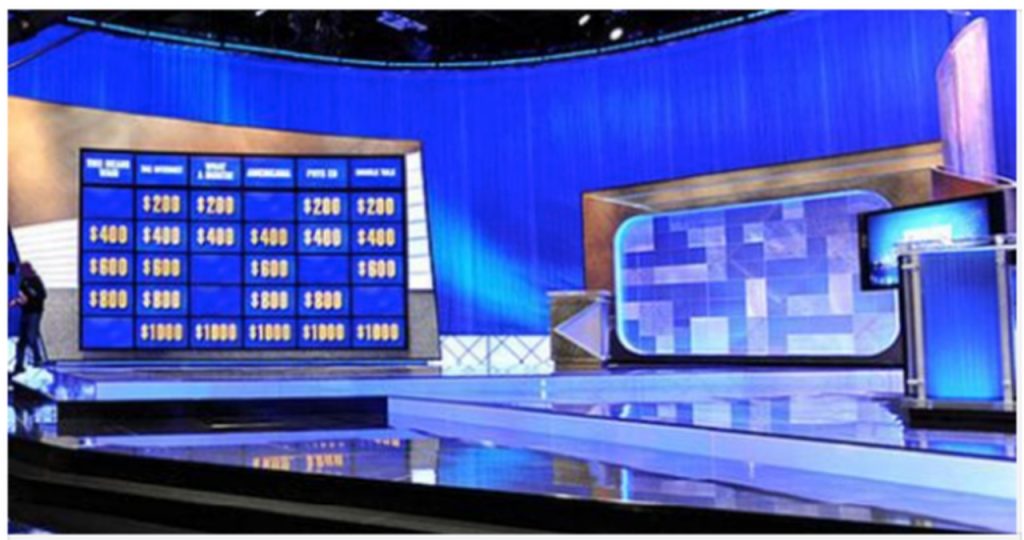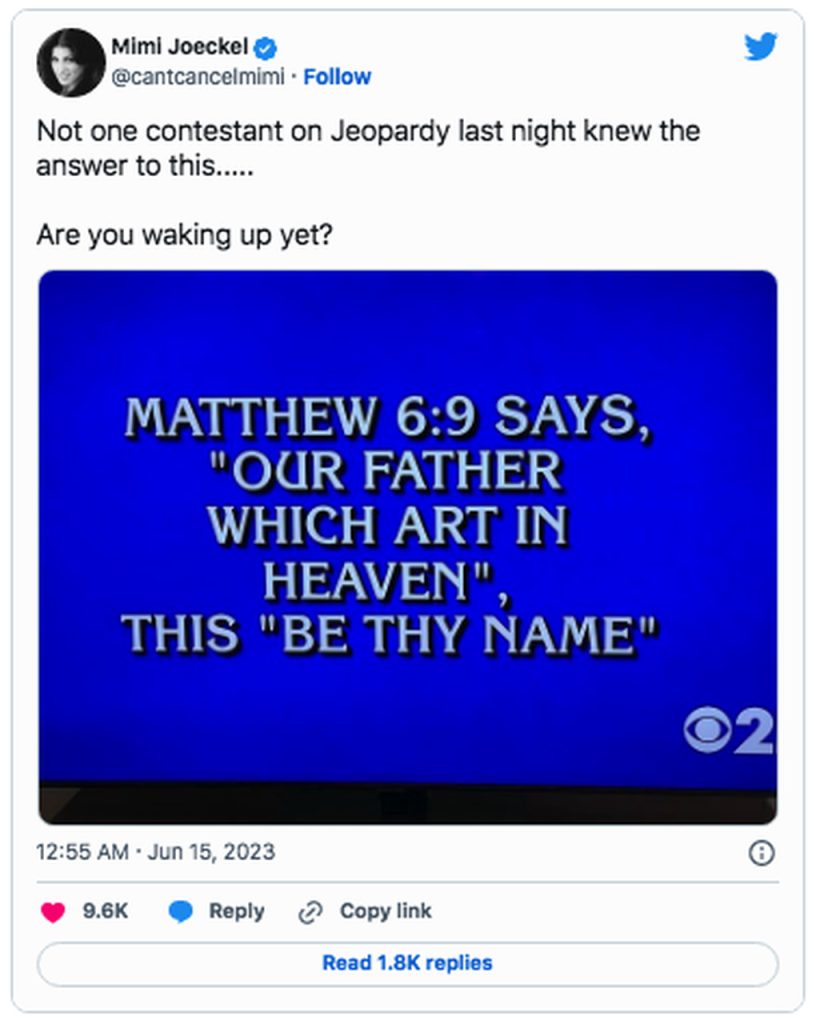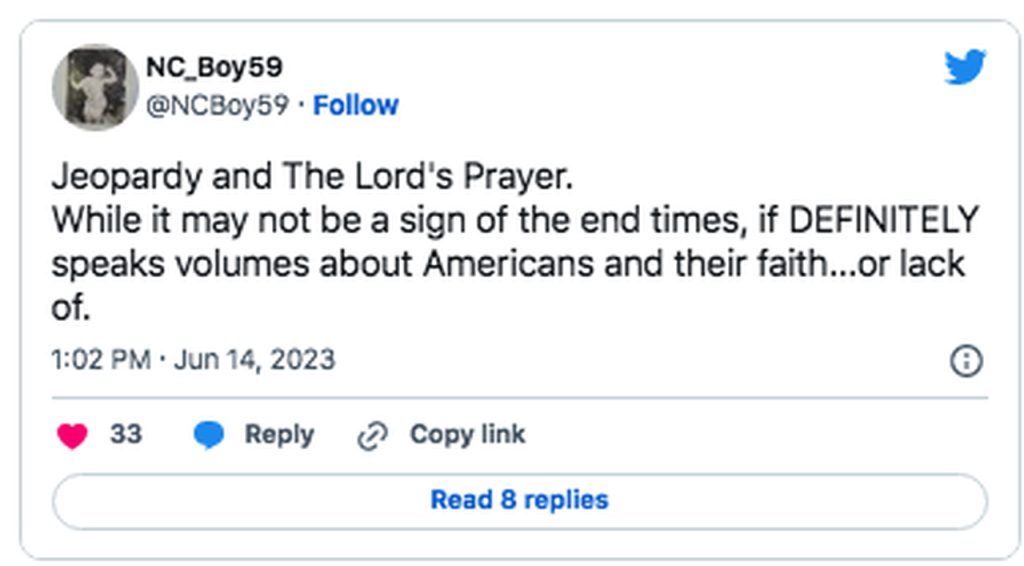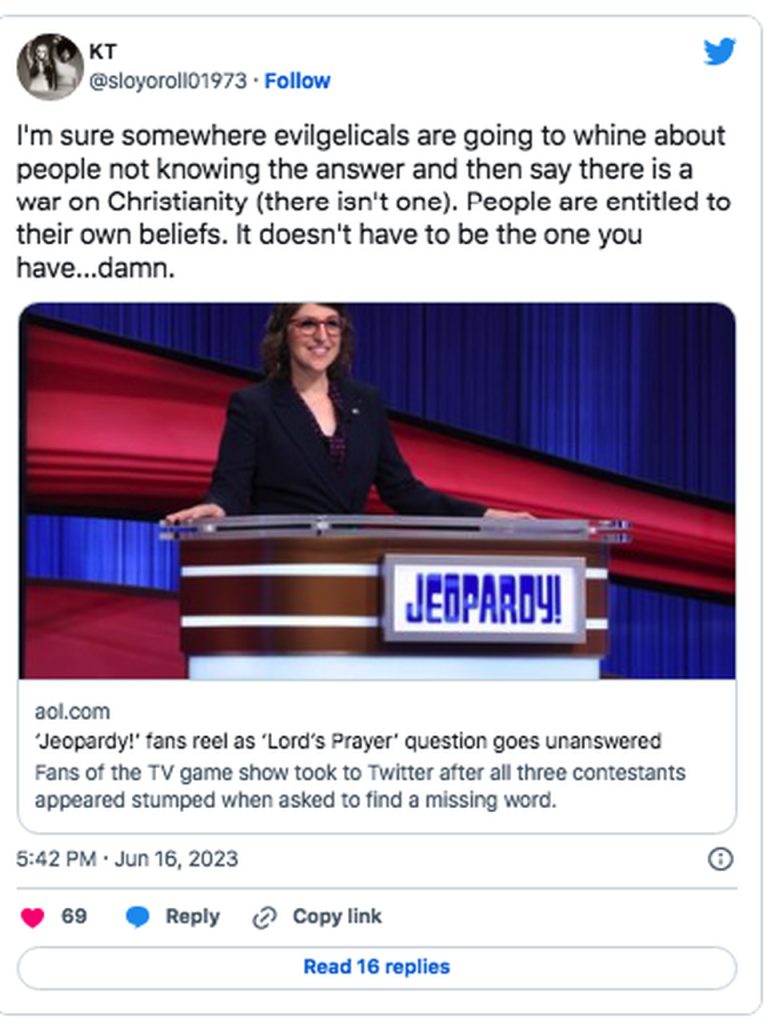Jeopardy! holds a longstanding reputation as one of America’s favorite game shows, where contestants use their sharp minds and broad knowledge to tackle questions that often challenge viewers at home. Recently, however, an episode sparked surprise—and even concern—among Christian audiences when none of the three contestants could answer a seemingly straightforward clue tied to the Lord’s Prayer.
On June 13, host Mayim Bialik presented a $200 question from the “Dadjectives” category, which, by Jeopardy! standards, is typically the easiest and least complex on the board. The clue referenced a line from the Lord’s Prayer: “This ‘Be Thy Name,’ Our Father Who Art in Heaven,” which stems from the Gospel of Matthew, specifically Matthew 6:9. The correct answer was “hallowed,” following Jeopardy!’s format where responses must be phrased as a question: “What is hallowed?” For many viewers raised in Christian traditions, especially those who learned the prayer by heart, the answer seemed self-evident. However, the contestants’ collective hesitation appeared to highlight the widening gap between religious literacy and popular culture.

The moment soon ignited conversations on social media. For some Christians, the contestants’ inability to recognize this familiar phrase from the Lord’s Prayer raised questions about the state of faith in modern America. “Are you awake yet?” one Twitter user posted, seemingly frustrated by what they perceived as a lapse in basic knowledge. Another likened learning the Lord’s Prayer as a child to memorizing the Pledge of Allegiance—a cultural staple, one of those things “you just did.” But while many were surprised, some went further, seeing the incident as symbolic of broader shifts. “Maybe it doesn’t mean the end of the world,” tweeted one observer, “but it speaks volumes about Americans’ beliefs—or lack of them.”
Others saw the moment as an indication of changing times. A few onlookers took a more philosophical approach, arguing that contestants from diverse backgrounds—those who may not have been raised in Christian households—are less likely to know specific religious references. This has, in fact, been a common trend on Jeopardy!, as the game show often includes questions about Christianity and the Bible, some of which can even stump regular church attendees. Yet despite this diversity in background, some were still taken aback that none of the contestants seemed to know the answer. “As an atheist, I still got that right,” one viewer tweeted, suggesting that knowledge of the Lord’s Prayer goes beyond belief and into general knowledge.

One viewer found humor in the situation, making a connection to pop culture: “The geeks are lost; they don’t know the answer! Don’t they listen to Iron Maiden?” This reference pointed to the band’s song, “Hallowed Be Thy Name,” as if suggesting that familiarity with heavy metal could provide clues for Jeopardy! questions as well.
The responses reflect a diversity of perspectives, but they also reveal a generational shift in exposure to certain religious or cultural texts. Some social media users argued that contestants might have hesitated to answer the question due to their relatively low scores at that point in the game; with Jeopardy!, there’s always a balance between confidently answering questions and strategically choosing when to risk points.
Throughout the years, Jeopardy! has been known for its occasional Bible-related questions, testing contestants with challenging references that even practicing Christians may find difficult. Yet for the faithful who were watching, it felt disheartening to see that one of the simplest references from the Lord’s Prayer, a cornerstone of Christian worship, could stump the contestants. In fact, some have expressed that Jeopardy! includes an overrepresentation of Christianity in its questions, something that has sparked a mix of appreciation and concern among viewers.
However, Jeopardy! has always welcomed contestants from many walks of life and religious backgrounds. This is likely a reason why the recent contestants, despite their deep general knowledge, may have struggled with a Christian reference. The diversity of perspectives on the show is both a strength and a source of occasional dissonance with segments of the audience who expect more familiarity with traditional texts. Thus, it’s entirely possible that these contestants were simply not as familiar with this aspect of Christian culture, which might have been more familiar to the show’s viewers.

After the initial round of questions, the competition moved on to the Final Jeopardy round, where the answer focused on 1970s pop culture rather than religion. The question was about an actor featured in two movies with the highest-selling soundtracks of 1978. While the contestants stumbled on the Lord’s Prayer, they found more success with this cultural question. The correct answer, “Who is John Travolta?” referenced his starring roles in Saturday Night Fever and Grease, both iconic films from the late 1970s with massively successful soundtracks. Suresh Krishnan, one of the contestants, capitalized on this knowledge, winning his sixth consecutive game.
For some fans, the contrast between the difficulty of the Lord’s Prayer clue and the familiarity of 1970s cinema was a reminder of how differently contestants’ expertise can align with various cultural touchpoints. Jeopardy! viewers are often treated to a variety of topics, reflecting a wide range of knowledge areas, from the Bible to pop culture.

So, how do you feel about these recent Jeopardy! questions? Do you think the incident points to changing times, where certain once-ubiquitous references are now less common knowledge? Or do you see it as a simple gap in religious trivia that doesn’t say much about broader American culture? Whatever your view, Jeopardy! continues to ignite fascinating discussions among viewers across the nation, proving that even a single question can reveal much about our shared knowledge and the values that shape us today.





